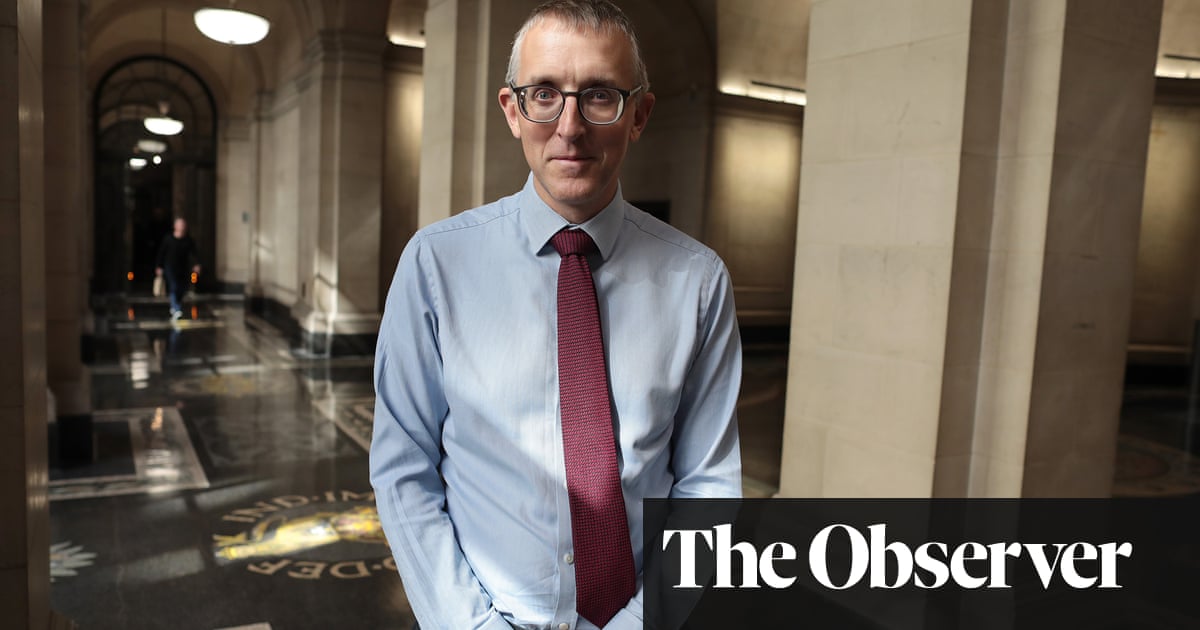
Sam Woods’s 20th wedding anniversary was more eventful than he’d expected. The boss of the Bank of England’s Prudential Regulation Authority (PRA) had headed to Devon for a celebratory weekend with his wife. But rather than settling in for dinner that evening, Woods had to book an extra hotel room to use as a makeshift crisis centre after US lender Silicon Valley Bank (SVB) suddenly collapsed.
Round-the-clock calls with ministers and City executives followed, but the hours bore fruit. At 7am on Monday it was announced that HSBC would come to the rescue, paying £1 for SVB’s UK operations and averting a cash crunch that could have paralysed Britain’s startup sector.
“The weekend went very well from a work point of view,” Woods says. “But from a home point of view, it was a disaster.”
With SVB UK’s fate settled, he tried to catch up on sleep – in vain. “I was woken by my opposite number in Switzerland saying: ‘Get out of bed. We need to talk about Credit Suisse’.”
The failure of Switzerland’s largest lender two weeks later capped a hectic period for the head of the UK’s financial stability regulator.
Months earlier he had steered the City through the gilt market meltdown that followed Liz Truss’s mini-budget, and a resulting surge in borrowing costs that raised fears over potential defaults and a wider housing market downturn. Meanwhile, Woods, 50, who is also a deputy governor of the Bank of England, had been preparing for a raft of post-Brexit changes to City regulations proposed by the government. They included changes to insurance sector rules, and led him to butt heads with Treasury officials.
“It has been the most intense period since 2008,” Woods says.
But his whole career has been shaped by crises. The former Treasury official helped set up UK Government Investments, a holding company to manage the taxpayer’s stakes in bailed-out banks such as Royal Bank of Scotland (now NatWest) and Lloyds, and later served on the Independent Commission on Banking, which crafted key post-crisis reforms, including those that now protect retail banking deposits from lenders’ riskier investment banking arms.
It was no surprise, then, that he was identified as a rising star when he joined the PRA – which emerged from the ashes of the discredited Financial Services Authority – in 2013. Three years later, Woods, whom colleagues describe as a “steel fist in a very charming velvet glove” replaced Andrew Bailey, now the Bank of England’s governor, as chief executive of the PRA.
Since then, he has had the not-so-simple task of ensuring the financial system remained stable through Brexit, Covid and Russia’s invasion of Ukraine. And while he admits autumn has had a “calmer start”, the regulator is “still on high alert”.
Woods, who was born in New Zealand but emigrated after being accepted at Oxford, says he has two areas of concern right now: commercial property – where demand has declined amid the rise in remote working – and the downturn in China’s property market. “But if experience tells me one thing, it’s that the things you name are probably not the ones that blow.”
He remains sanguine about the UK housing market, despite data showing a 29% jump in mortgage arrears to £16.9bn. He notes that the proportion of borrowers falling into arrears is just over 1%, far below the 3.6% seen in 2009. And barring a significant rise in unemployment, the threat to financial stability is low, he says.
“Probably the most important thing the PRA has done in its 10 years is rebuild the strength of the banking system” and the amount of capital in it, says Woods. “The amount we’ve got in there is designed to be enough to withstand a very large shock, which we’re nowhere near seeing.”
Evidence for this comes, in part, from stress tests, where lenders prove they can survive and keep lending through a major market downturn.
There were concerns, though, that the most recent stress test only measured banks against interest rates of 6%. While that scenario also involved a hypothetical recession, a 30% drop in house prices and 8.5% unemployment, the current base rate of 5.25% is a bit close for comfort.
But Woods says the PRA has tested its maths. “We have done some ready reckoners to ask ourselves what might the effects [of higher interest rates] be. And we were confident the capital in the system could accommodate that.”
The deputy governor concedes that the regulator does “need to evolve” its approach to stress tests, partly to account for the speed at which money can move in an increasingly digital world, and the role social media can play in sparking panic and accelerate bank runs, as happened in March.
Woods says he is also looking to put banks through more severe stress testing on climate change, measuring their preparedness for a catastrophe that severely shifts national regulations and sends shockwaves through global markets. “Imagine Westminster under water – a really extreme thing that made policy shift in a very dramatic way,” he says.
The results could leave the door open for requirements that make it more expensive to lend or offer services to oil companies and carbon-heavy industries. But what if politicians deem those plans to be in conflict with the regulator’s new – albeit secondary – responsibility to promote firms’ economic growth and international competitiveness? Leading economists and politicians, including former business minister Vince Cable, are concerned that those secondary objectives risk recreating the conditions that led to the 2008 banking crash.
But Woods insists the PRA will never forgo stability to promote growth.
“It should be an important secondary consideration,” he says. “What we should never do is say, ‘OK, let’s do a bit more for competitiveness, and we’ll weaken the system a bit, and do something that’s bad for policyholder protection.’ But there are things we can do which don’t raise that tension.”
There have been tensions elsewhere though, particularly with the Treasury, which recently overruled Woods on technical aspects of insurance reforms known as Solvency II. Ministers want to overhaul the rules so more cash from UK pension and insurance funds can be funnelled into UK companies and infrastructure projects, but critics worry it could leave them exposed to risky ventures.
“Beyond that, I think things are fine,” Woods says on his relationship with government. “It’s quite natural to have a disagreement from time to time. Indeed, if the regulators and the government never disagreed, what would be the point of having the regulators outside government?”
But Woods stands by the government’s handling of at least one recent controversy: its role in the resignation of NatWest boss Alison Rose in July, after a row with Nigel Farage.
Woods said it was unrealistic to think the government would not get involved in such an “extremely political” scandal, given that NatWest is still 38.5% state-owned. The row snowballed after Rose breached client confidentiality by discussing Farage’s case with a journalist.
However, Woods said government should go back to staying out of NatWest’s business. “I do think it’s desirable that the government continues with what it’s done for the last 15 years,” noting that politicians had otherwise “been very scrupulous about not involving itself in the affairs of NatWest”.
As for his future, Woods hopes another public service role at home or abroad is on the cards. He refuses to say whether he would consider replacing Bailey as Bank of England governor, but he has cheerleaders in the wings.
“He’s a very credible governor candidate,” says a former colleague. “This guy is a serious national asset. I’ve never met a person who speaks poorly of him. He’s a tough guy, but fair, honest, very direct. You know where you stand.”
For now, the important thing for Woods is to be kept on his toes. “My greatest fear is to be bored. So I’ve chosen the right job, because I’m never bored.”












